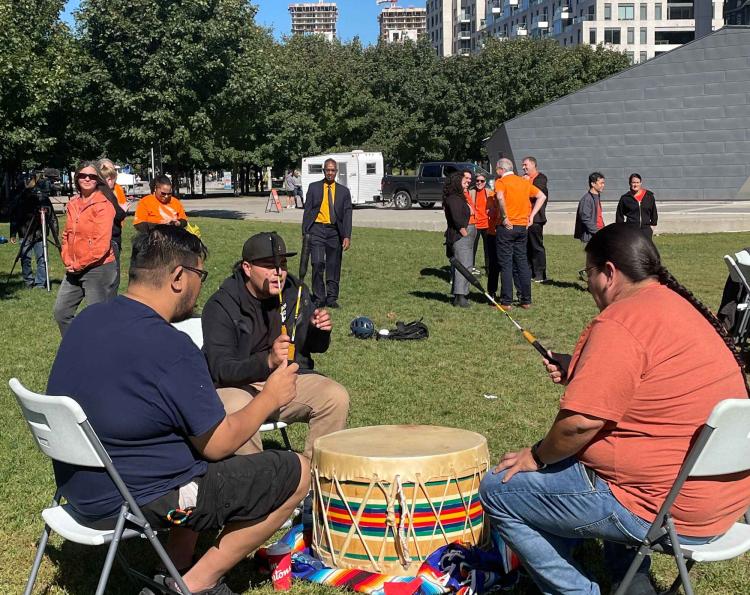
September 30 marks the second annual National Day for Truth & Reconciliation, which honours residential school survivors, their families, and communities. This day underscores our shared responsibility to educate ourselves on the tragic history and legacy of residential schools, and to take action in support of reconciliation. Orange Shirt Day also celebrates Indigenous resistance, resilience and the importance of healing initiatives and collective participation.
To reflect, a Sacred Fire Ceremony was held at Waterfront Campus. Around the crackling fire, Fire Keeper Jim Seegers encouraged those present to reflect, remember and set good intentions.
What is a sacred fire?
At an Indigenous Knowledge Keeper Series event earlier this week, Raiden Levesque, Traditional Knowledge Keeper and Fire Keeper, explained the importance of fire in Indigenous tradition. “Fires are used to start ceremonies, commemorate important events, and open a pathway to the spirit world,” he said.
Levesque said the most important thing at a fire ceremony is the presence of tobacco. “We ask the tobacco to help guide the ceremony,” he said. “It’s to thank and acknowledge those who came before us.”
Levesque also stressed what not to do around a sacred fire, including using substances (such as alcohol), curse words or putting man-made materials into the fire. However, this may be different depending on the Fire Keeper.
The Medicine Table
A medicine table close to the fire held four medicines: tobacco, white sage, cedar and sweetgrass. Members of the Indigenous Initiatives team explained the significance of each medicine to attendees – from cleansing to reaching the spirit world – before instructing them on how to properly distribute their chosen medicine into the fire.


Fruits and seeds
Also present were two sacred fruits: pawpaw (Asimina triloba), a member of the Annonaceae, or custard-apple, family; and American persimmons (Diospyros virginiana). Pawpaw has continued to grow in Ontario thanks to Indigenous communities.
song and dance
Indigenous drummers sang and played traditional songs throughout the ceremony.

Becoming better allies
“At events like these, it’s so important for the community to come out and support the Indigenous community as allies,” said Audrey Rochette, Director, Indigenous Initiatives.
Levesque echoed that statement earlier in the week.
“Commemorating September 30 is important, but I encourage you to think about Indigenous communities all year-round,” said Levesque. “How can we make things better for our Indigenous communities? How can we all become better allies?”
To learn more about our commitment to Indigenous Initiatives and for information about upcoming Indigenous Knowledge Keeper Series events, visit georgebrown.ca/indigenous.
